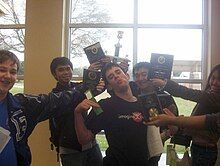User:Mike409/mathlete

A mathlete is a person who competes in mathematics competitions at any level or any age. The term is a portmanteau of the words math and athlete. There are various mathletes around the world.
Top mathletes in the United States compete on the AIME, USAMO, and ARML. Those in other countries generally participate in national olympiads to qualify for the International Mathematical Olympiad.
Participants in World Math Day are commonly referred to as mathletes.
North American Mathletic Leagues
[edit]Youth League
[edit]In the United States most settlements above a certain population threshold have active youth mathletic leagues. Generally, all children above the age of 5 have participated in some form of mathletics in an attempt to discover raw mathletic talent. Most youth mathletes are left behind as they transition into the Amateur League.
Amateur Mathletics
[edit]high school
Farm Team Mathletics
[edit]college
Minor League Mathletics
[edit]graduate school
Professional Mathletics
[edit]post doctoral/ teaching
Mathlympics
[edit]Unlike other competitive fields, the Mathletic Olympics are a continuous function where mathletecs attempt to solve major problems which have remained unsolved for many years, sometimes centuries. In recent history there have been two major Mathlympic triumphs. In 1995 Andrew Wiles published his proof for Fermat's Last Theorem becoming the first person to do so. The new millenium heralded the solution of a second unresolved
millenium prize, hilberts problems
Mathletic Competitions
[edit]The Putnam Exam: The William Lowell Putnam Competition is the preeminent undergraduate level mathleltic competition. Administered by the Mathematical Association of America, students compete as individuals and as teams (as chosen by their Institution) for scholarships and team prize money. The exam is administered on the first Saturday in December.[1]
The GRE Subject Test: While some may think of the Mathematics GRE Subject Test as an individual examination, it is truly a struggle of one versus many. When graduate programs evaluate an individual they are not considered apart from every other student. Teaching fellowships and other funding can only go to a limited number of students and each institution seeks to maximize its return on investment by selecting the best available candidate for their program.[2]
Mathletic Off-Season Training
[edit]The Academic off-season (traditionally referred to as "summer") can be especially difficult on mathletes, though various training regiments have been proposed to keep mathletic ability at its peak. Publications such as the MAA's The American Mathematical Monthly and the AMS's Notices of the American Mathematical Society are widely read to maintain and hone mathematical ability. Some coaches suggest seeking research internships or grants, many of which are funded by the National Science Foundation.
